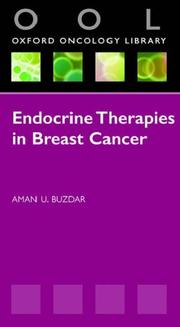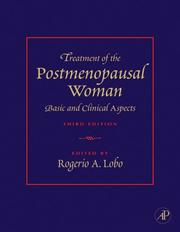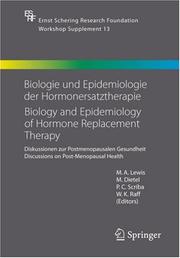| Listing 1 - 10 of 38 | << page >> |
Sort by
|
Book
ISBN: 0309677157 0309677130 Year: 2020 Publisher: Washington, District of Columbia : The National Academies Press,
Abstract | Keywords | Export | Availability | Bookmark
 Loading...
Loading...Choose an application
- Reference Manager
- EndNote
- RefWorks (Direct export to RefWorks)
Menopause. --- Menopause --- Hormone therapy. --- Treatment.

ISBN: 0191739871 0199606994 1283580756 9786613893208 0191575178 9780191575174 9780199218141 0199218145 9780191739873 9780199606993 9781283580755 661389320X Year: 2007 Publisher: Oxford New York Oxford University Press
Abstract | Keywords | Export | Availability | Bookmark
 Loading...
Loading...Choose an application
- Reference Manager
- EndNote
- RefWorks (Direct export to RefWorks)
Breast cancer is one of the leading causes of cancer mortality in women worldwide, and the risk of disease recurrence continues despite improvements in screening and treatment. For patients with hormone receptor-positive breast cancer, some form of endocrine therapy is central to the management of their disease. Tamoxifen has long been the mainstay of endocrine therapy in this group of patients. However, there is mounting evidence showing that the aromatase inhibitors are able toreduce overall oestrogen levels and appear to be better tolerated over a long term than tamoxifen. New and emerging
Breast --- Cancer --- Hormone therapy. --- Endocrine aspects.
Book
ISBN: 9783030927356 Year: 2022 Publisher: Cham Springer International Publishing :Imprint: Springer
Abstract | Keywords | Export | Availability | Bookmark
 Loading...
Loading...Choose an application
- Reference Manager
- EndNote
- RefWorks (Direct export to RefWorks)
Book
ISBN: 1617052205 9781617052200 9781936303663 1936303663 Year: 2014 Publisher: New York, NY
Abstract | Keywords | Export | Availability | Bookmark
 Loading...
Loading...Choose an application
- Reference Manager
- EndNote
- RefWorks (Direct export to RefWorks)
Prostate --- Antiandrogens --- Androgen antagonists --- Androgens --- Antimetabolites --- Hormone antagonists --- Steroid drugs --- Cancer --- Hormone therapy. --- Therapeutic use. --- Antagonists
Book
ISBN: 1624173934 9781624173936 1624173780 9781624173783 Year: 2013 Publisher: New York : Nova Science Publishers,
Abstract | Keywords | Export | Availability | Bookmark
 Loading...
Loading...Choose an application
- Reference Manager
- EndNote
- RefWorks (Direct export to RefWorks)
Cancer --- Estrogen. --- Breast --- Oestrogen --- Hormones, Sex --- Anti-estrogenic diet --- Hormone therapy. --- Cancer. --- Endocrine aspects --- Treatment
Book
ISBN: 3036571175 3036571167 Year: 2023 Publisher: [Place of publication not identified] : MDPI - Multidisciplinary Digital Publishing Institute,
Abstract | Keywords | Export | Availability | Bookmark
 Loading...
Loading...Choose an application
- Reference Manager
- EndNote
- RefWorks (Direct export to RefWorks)
In this Special Issue, authors from nine countries on five continents provide overviews on and insights into current research topics related to the 'Genetic Complexity of Hormone-Sensitive Cancers'. The chapters cover topics on completely novel technologies and instruments revolutionizing our view of biological entities, and also, novel extensions and revisions of existing and well-established technologies such as genetic probes and bar-coding techniques, which add a new dimension to microscopy, as they allow us to visualize DNA sequences and mRNA in situ. With this Special Issue, the editors wanted to create a forum for the international biomedical research community to compile their data on the genetic complexity of cancer in a unique resource. While this collection of articles cannot certainly claim completeness in any way, it represents an attractive collection of the different aspects of hormone-dependent cancers and will hopefully encourage further targeted research.
Cancer --- Endocrine aspects. --- Hormone therapy. --- Cancer endocrinology --- Hormonal aspects of cancer --- Endocrine aspects --- Treatment --- Hormonal aspects

ISBN: 128104962X 9786611049621 0080553095 0123694434 Year: 2007 Publisher: Burlington, MA : Academic Press/Elsevier,
Abstract | Keywords | Export | Availability | Bookmark
 Loading...
Loading...Choose an application
- Reference Manager
- EndNote
- RefWorks (Direct export to RefWorks)
For anyone who treats postmenopausal women, this latest edition of Rogerio Lobo's classic work combines the best from two well-known references: Menopause, and the second edition of Treatment of the Postmenopausal Woman. By adding significant discussions of the basic science behind menopause, it is possible to objectively assess the clinical value and limitations of current approaches to treatment and provide a basis and rationale for strategies that will result in better individualized and specialized care. Not only does the third edition discuss diagnosis and treatment of menop
Menopause --- Complications. --- Hormone therapy. --- Estrogen replacement therapy for menopause --- Hormone replacement therapy for menopause --- Hormone therapy --- Change of life in women --- Female change of life --- Female climacteric --- Climacteric --- Estrogen replacement therapy --- Hormone replacement therapy

ISSN: 09476075 ISBN: 1280902647 9786610902644 3540378618 3540323414 Year: 2006 Volume: 13 Publisher: Berlin : Springer,
Abstract | Keywords | Export | Availability | Bookmark
 Loading...
Loading...Choose an application
- Reference Manager
- EndNote
- RefWorks (Direct export to RefWorks)
Die Vor- und Nachteile der Hormonersatztherapie (HRT) werden von einer Expertengruppe hinsichtlich der epidemiologischen Beweislage diskutiert. Den Diskussionsschwerpunkt bildet jedoch die Problematik des Brustkrebsrisikos. Unter anderem wird gezeigt, dass die aus epidemiologischen Studien abgeleiteten Ergebnisse sich nicht mit den Wachstumseigenschaften dieser Tumoren decken, so dass weiterführende Bevölkerungsuntersuchungen unter Einbeziehung pathobiologischen Sachverstands notwendig erscheinen. The benefits and risks of hormone replacement therapy (HRT) are discussed by a group of experts with a view towards the evidence provided by recent epidemiological studies. Although all aspects of HRT indications and contra-indications are reviewed, the particular emphasis of this discussion is on breast cancer. Among other things, it is shown that the evidence on breast cancer provided in epidemiological studies does not match the growth characteristics of the tumours, and that further population research incorporating pathobiological assessments is required.
Estrogen --- Menopause --- Therapeutic use --- Hormone therapy --- Change of life in women --- Female change of life --- Female climacteric --- Climacteric --- Oestrogen --- Hormones, Sex --- Anti-estrogenic diet
Book
ISBN: 981107013X 9811070121 Year: 2018 Publisher: Singapore : Springer Singapore : Imprint: Springer,
Abstract | Keywords | Export | Availability | Bookmark
 Loading...
Loading...Choose an application
- Reference Manager
- EndNote
- RefWorks (Direct export to RefWorks)
This comprehensive reference expounds the current state of hormone therapy and castration resistance of prostate cancer (PCa). Previously, the incidence of PCa in Asian countries was relatively low, but it has been increasing dramatically in recent years. Although most of the new cases are diagnosed in early stages, a significant proportion of patients receive hormone therapy for metastatic disease or for relapse after local treatment. Thus the situation has gradually changed toward earlier and longer use of hormone therapy. The malignancy finally forms castration-resistant prostate cancer (CRPC) despite the lack of testicular androgen. With advances in understanding of the molecular basis of hormone dependence and CRPC, many new androgen receptor-targeted agents have emerged. During the last decade, much evidence on hormone therapy has been accumulated in Japan. Interestingly, some of these findings are different from those reported from Western countries, suggesting ethnic variation in the outcome of hormone therapy. In the chapters of this book, expert authors provide exhaustive interpretations of the evidence recently reported from Japan and provide important Asian perspectives on hormone therapy for PCa. This work benefits not only Asian urologists but also their Western counterparts and all physicians and medical personnel who are involved in the treatment of PCa.
Medicine. --- Oncology. --- Urology. --- Medicine & Public Health. --- Medicine --- Genitourinary organs --- Tumors --- Clinical sciences --- Medical profession --- Human biology --- Life sciences --- Medical sciences --- Pathology --- Physicians --- Diseases --- Prostate --- Cancer --- Hormone therapy. --- Oncology .
Book
ISBN: 1683927524 1683927532 Year: 2019 Publisher: Bloomfield : Mercury Learning & Information,
Abstract | Keywords | Export | Availability | Bookmark
 Loading...
Loading...Choose an application
- Reference Manager
- EndNote
- RefWorks (Direct export to RefWorks)
Treating cancer has always been a major challenge. Although great strides in treatment have taken place in recent years, all too often current treatments are less than effective, or patients relapse. Newer methods of cancer treatment, namely targeted therapy and immunotherapy have generated great excitement in the scientific community. These newer methods of cancer treatment hold promise for patients who otherwise may have few options. Using the principles of health literacy, this updated edition includes many new therapies and describes the essential features of cancer treatments available to the general public in an engaging and stimulating manner. A simple, question/answer format and the use of illustrations, tables, charts, and boxes that highlight definitions, facts, and website links provide more detailed information.Features:Provides questions and answers about the characteristics of cancer, diagnosis, classifications, surgery, chemotherapy, radiation therapy, targeted therapy, adoptive cell therapy, new developments, and moreCites many new therapies and includes numerous in-text Web links to information at the National Institutes of Health, the National Cancer Institute, journals, and other online sourcesUses animations, practical tips, charts and tables, figures, and photos to explain topics under discussion.
Cancer --- Immunotherapy. --- Treatment. --- adoptive cell therapy. --- cancer. --- chemotherapy. --- hormone therapy. --- immune system. --- immunotherapy. --- radiation. --- surgery. --- targeted therapy. --- treatment. --- HEALTH & FITNESS / Diseases / Cancer.
| Listing 1 - 10 of 38 | << page >> |
Sort by
|

 Search
Search Feedback
Feedback About UniCat
About UniCat  Help
Help News
News